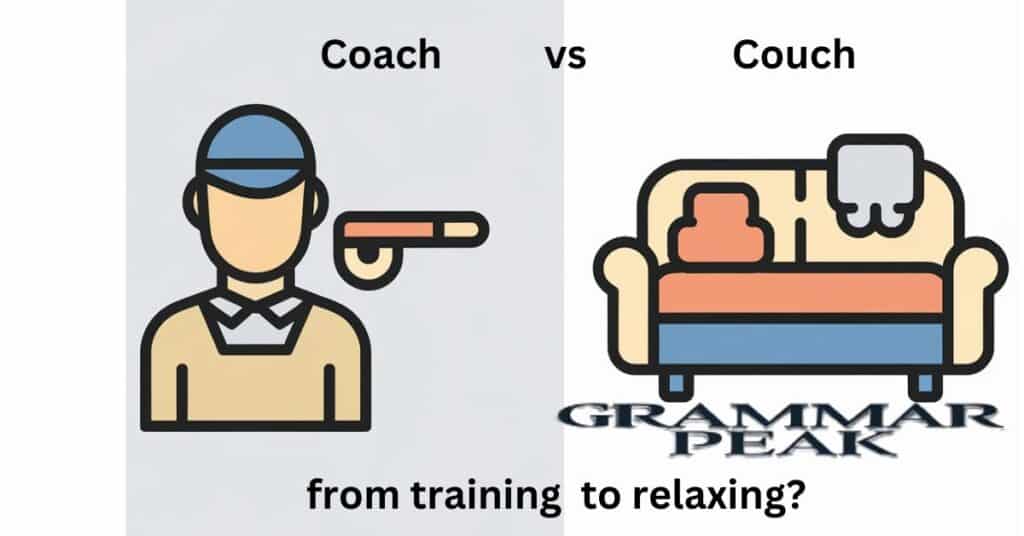The terms “coach” and “couch” represent distinctly different concepts, despite their similar pronunciation. A “coach” refers to a person who trains or guides individuals or teams, often in sports or personal development contexts.
This term embodies the role of an instructor or mentor, emphasizing motivation and skill-building. On the other hand, a “couch” is a piece of furniture designed for sitting or reclining, symbolizing comfort and relaxation in home environments. Recognizing the differences between these two words can enhance clarity in communication.
Why is There Confusion?
The confusion between “coach” and “couch” primarily arises from their phonetic similarities. Both words consist of a single syllable and share a similar vowel sound, making them easy to mix up, especially in casual conversation or rapid speech.
This auditory overlap can lead to misunderstandings, particularly for those who are still mastering the nuances of the English language. Another contributing factor to this mix-up is the distinct contexts in which these terms are often used. While “coach” is frequently associated with sports, training, and personal development, “couch” is tied to home life and relaxation.
In informal discussions, especially among friends or in sports settings, someone might mistakenly refer to a “couch” when they mean “coach,” leading to humorous or awkward exchanges that highlight the importance of context in communication. Additionally, the difference in meaning can create confusion for learners of English who may not yet be familiar with the specific roles these words play.
You will like Coach vs Couch: Definitions, Differences, and Examples
What Does “Coach” Mean?
The term “coach” has several meanings. Primarily, it refers to a person who trains athletes in sports. A sports coach helps players improve their skills and strategies. For example, a basketball coach teaches players how to shoot, pass, and defend.
Coaches also provide motivation and support, helping athletes reach their full potential. In addition to sports, the word “coach” can refer to someone who guides
in other areas. A life coach helps individuals set and achieve personal goals. They offer advice and support, helping clients navigate challenges in their lives.
What Does “Couch” Mean?
On the other hand, “couch” refers to a type of furniture designed for sitting or reclining. Couches are common in living rooms and are often used for relaxation and socializing. They come in various styles, such as sectionals, loveseats, and recliners. A lounge sofa is another term for a couch, emphasizing its role in providing comfort.
Couches are not just for sitting; they also play a significant role in home decor. A well-chosen couch can enhance the overall look of a room. People often gather on couches to watch movies, chat, or simply relax. The “couch potato” phrase describes someone who spends a lot of time sitting on the couch, usually watching TV.
Read must be Coach vs Couch: Definitions, Differences, and Examples
Key Differences Between “Coach” and “Couch”
Definition and Usage
The primary difference between “coach” and “couch” lies in their definitions. A coach is a person who provides training and guidance, while a couch is a piece of furniture for sitting or lounging. Understanding these definitions is crucial for using the words correctly in conversation.
Pronunciation
The pronunciation difference is another key factor. “Coach” is pronounced /koʊtʃ/, while “couch” is pronounced /kaʊtʃ/. This subtle difference can be challenging for non-native speakers. Practicing the sounds can help improve clarity in speech.
Spelling and Visual Cues
The spelling difference is straightforward. “Coach” has an “a,” while “couch” has a “u.” This distinction is essential for writing correctly. Visual cues can also help. For instance, when you see a person giving a pep talk, think of “coach.” When you see a comfortable piece of furniture, think of a “couch.”
| Aspect | Coach | Couch |
| Function | Provides direction and support to enhance skills and performance. | Offers a comfortable place for sitting, relaxing, or socializing. |
| Common Settings | Found in sports arenas, classrooms, and personal development workshops. | Primarily located in homes, lounges, and recreational areas. |
| Emotional Connotation | Often associated with inspiration, motivation, and teamwork. | Evokes feelings of comfort, relaxation, and homey warmth. |
| Variations | Can refer to different types of coaching, such as life coaching or sports coaching. | Includes various styles, such as sectional sofas, loveseats, and recliners. |
| Potential Confusion | May be mistakenly referred to in contexts involving furniture or leisure. | Can be incorrectly used when discussing guidance or mentorship roles. |
Synonyms for “Coach” and “Couch”
Synonyms for “Coach”
- Trainer: Someone who helps others improve their skills, especially in sports.
- Mentor: A guide who offers advice and support, often in personal or professional growth.
- Instructor: An individual who teaches a specific subject or skill, often in an educational setting.
- Guide: A person who leads and directs others, particularly in navigating challenges or opportunities.
- Advisor: Someone who provides expert advice, especially in academic or career-related matters.
- Facilitator: A person who helps a group work together more effectively, ensuring that everyone has a voice.
- Trainer: This term is often used in fitness or athletic contexts, focusing on enhancing physical performance.
- Counselor: A professional who offers guidance and support, often in a therapeutic or personal development context.
- Life Coach: A person who helps clients achieve personal goals and improve their overall quality of life.
- Sports Coach: A specialized coach who trains athletes in specific sports to enhance their performance.
- Director: Someone who oversees a group or organization, often making strategic decisions for improvement.
- Educator: A broader term that encompasses anyone who teaches or instructs in a formal or informal setting.
Synonyms for “Couch”
- Sofa: A common term used to describe a comfortable seating option, often found in living rooms.
- Settee: A smaller, often more decorative version of a couch, typically designed for two people.
- Divan: A style of couch that usually has no back or arms and is often used for lounging.
- Recliner: A type of couch that can be adjusted to lean back, perfect for relaxation.
- Lounge: A casual seating option that emphasizes comfort and is often used in informal settings.
- Futon: A versatile piece of furniture that can serve as both a couch and a bed, popular in smaller spaces.
- Chesterfield: A classic style of couch known for its tufted upholstery and rolled arms.
- Couch Potato: A humorous term that describes someone who spends a lot of time lounging on the couch, often watching TV.
- Sectional: A modular couch made up of multiple pieces that can be arranged in various configurations.
- Love Seat: A small couch designed for two people, ideal for intimate conversations.
- Daybed: A couch that can be used for sitting during the day and sleeping at night, often with a trundle.
- Bench: A long seat that can accommodate several people, usually without back support, often found in outdoor settings or hallways
Examples in Context
Examples in Context for Coach
- The coach analyzed the players’ performance to improve their skills for the next match.
- During halftime, the coach motivated the athletes by saying, “Believe in yourselves; you can win this game!”
- A soccer coach often emphasizes teamwork, reminding players, “Together, we are stronger.”
- The coach developed a training plan that focused on both physical fitness and strategy.
- In a corporate setting, a coach might say, “Effective communication is key to a successful team.”
- The coach encouraged the runners, “Push through the pain; the finish line is in sight!”
- After the match, the coach provided constructive feedback, saying, “Let’s work on our defense for next time.”
- A personal coach may suggest, “Visualize your success to help you stay motivated.”
- The coach shared a famous quote, “Success is not final; failure is not fatal: It is the courage to continue that counts.”
- The basketball coach emphasized discipline by stating, “Hard work beats talent when talent doesn’t work hard.”
Examples in Context for Couch
- After a long day, she sank into the couch and sighed, “This is the best spot to unwind.”
- He invited his friends over, saying, “Grab a seat on the couch; we’re going to have a movie marathon.”
- “My couch is the centerpiece of my living room,” she proudly declared, showcasing her home decor style.
- On lazy Sundays, they often relax on the couch, enjoying coffee and conversation.
- The kids jumped on the couch, laughing, “This is our favorite place to play!”
- “I need a new couch,” he said, “this one is starting to look worn out.”
- During the game, they all gathered on the couch, cheering for their favorite team.
- She rearranged the furniture, declaring, “The couch needs to face the window for better light.”
- The couch was so inviting that he thought, “I could easily take a nap here.”
- “Let’s put some throw pillows on the couch to make it more cozy,” she suggested for a warmer atmosphere.
Etymology of “Coach” and “Couch”
Etymology of “Coach”
The etymology of “couch” reveals interesting historical roots. The word comes from the Old French term “couche,” meaning “to lie down,” which itself is derived from the Latin “collocare,” meaning “to place.” Initially, the term referred to a type of bed or a piece of furniture for reclining, but over time, it evolved to describe the comfortable seating we know today.
As the concept of comfort and lounging grew in popularity, the couch became a staple in homes around the world. It transformed from a simple resting place to a central piece of living room furniture, symbolizing relaxation and social interaction.
Etymology of “Couch”
The etymology of “couch” can be traced back to the Latin term “collocare,” which means “to place” or “to lay down.” This origin highlights the primary function of a couch as a piece of furniture designed for reclining or resting.
As language evolved, the term transitioned through Old French as “couche,” further emphasizing its connection to lying down and relaxation. Over time, the meaning of the word expanded, reflecting changes in furniture design and social practices. By the time it entered English usage, “couch” had come to represent a specific style of comfortable seating that is central to modern living spaces.
FAQ” S
What is the main difference between “coach” and “couch”?
The main difference is that a coach is a person who provides training, while a couch is a piece of furniture for sitting.
How do you pronounce “coach” and “couch”?
“Coach” is pronounced /koʊtʃ/, and “couch” is pronounced /kaʊtʃ/.
Can “coach” refer to something other than sports?
Yes, “coach” can also refer to someone who provides guidance in personal development or business.
What are some synonyms for “couch”?
Synonyms for “couch” include sofa, settee, and divan.
What is the origin of the word “coach”?
The word “coach” comes from the Hungarian word “kocsi,” which originally referred to a vehicle.
Conclusion
In summary, understanding the differences between “coach” and “couch” is essential for clear communication. These words have distinct meanings, pronunciations, and uses. By recognizing these differences, you can avoid common mix-ups and enhance your vocabulary. Remember, a coach trains and guides, while a couch provides comfort and relaxation.

Mason Blake is an experienced blogger with a passion for language and communication. With years of expertise in crafting informative and engaging content, Mason shares valuable insights on grammar and writing. His clear, concise, and reader-friendly approach has earned him a loyal following, helping readers sharpen their language skills and master the art of effective communication.








I don’t think the title of your article matches the content lol. Just kidding, mainly because I had some doubts after reading the article.
Your point of view caught my eye and was very interesting. Thanks. I have a question for you.
Thanks for sharing. I read many of your blog posts, cool, your blog is very good.
Thank you for your sharing. I am worried that I lack creative ideas. It is your article that makes me full of hope. Thank you. But, I have a question, can you help me?
I don’t think the title of your article matches the content lol. Just kidding, mainly because I had some doubts after reading the article.
https://t.me/s/Official_1win_kanal/709
Официальный Telegram канал 1win Casinо. Казинo и ставки от 1вин. Фриспины, актуальное зеркало официального сайта 1 win. Регистрируйся в ван вин, соверши вход в один вин, получай бонус используя промокод и начните играть на реальные деньги.
https://t.me/s/Official_1win_kanal/3661
Can you be more specific about the content of your article? After reading it, I still have some doubts. Hope you can help me.
Thanks for sharing. I read many of your blog posts, cool, your blog is very good. https://www.binance.com/lv/register?ref=B4EPR6J0
Can you be more specific about the content of your article? After reading it, I still have some doubts. Hope you can help me. https://www.binance.info/en-IN/register?ref=UM6SMJM3